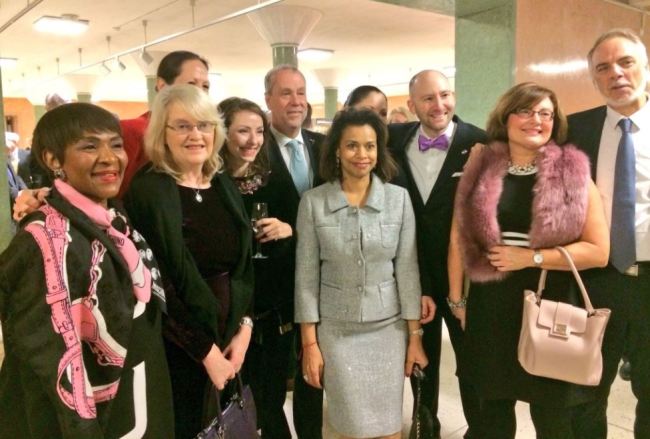Diplomats from the disarmament delegations of Austria, Brazil, Ireland, Mexico, New Zealand and South Africa, as well as Costa Rica’s permanent representative to the United Nations, Ambassador Elayne Whyte Gomez, have received the highest number of votes in a recent online poll to recognize the “2017 Arms Control Person(s) of the Year.”
The distinction recognizes their efforts to bring into being the historic Treaty on the Prohibition of Nuclear Weapons, which was adopted by the UN on July 7 last year.
The treaty is the first legally binding international agreement to comprehensively ban nuclear weapons, with the ultimate goal of totally eliminating them. The envoys and Whyte Gomez played key roles in multilateral talks leading to the treaty’s conclusion and signature, according to the Arms Control Association.
“In a year marked by rising tensions between the world’s nuclear-armed states, the negotiation on the Treaty on the Prohibition of Nuclear Weapons stands out as a historic achievement,” said the association’s Executive Director Daryl Kimball.
“The strong affirmative vote for the disarmament teams from Austria, Brazil, Ireland, Mexico, New Zealand and South Africa, and Ambassador Whyte Gomez, reflects their pivotal role in negotiations leading to the treaty and the pursuit of a world without nuclear weapons.”
The distinction recognizes their efforts to bring into being the historic Treaty on the Prohibition of Nuclear Weapons, which was adopted by the UN on July 7 last year.
The treaty is the first legally binding international agreement to comprehensively ban nuclear weapons, with the ultimate goal of totally eliminating them. The envoys and Whyte Gomez played key roles in multilateral talks leading to the treaty’s conclusion and signature, according to the Arms Control Association.
“In a year marked by rising tensions between the world’s nuclear-armed states, the negotiation on the Treaty on the Prohibition of Nuclear Weapons stands out as a historic achievement,” said the association’s Executive Director Daryl Kimball.
“The strong affirmative vote for the disarmament teams from Austria, Brazil, Ireland, Mexico, New Zealand and South Africa, and Ambassador Whyte Gomez, reflects their pivotal role in negotiations leading to the treaty and the pursuit of a world without nuclear weapons.”

More than 2,500 individuals from over 90 countries voted online from Dec. 8 last year through Jan. 5, the highest number of votes from the widest range of countries in the contest’s 10-year history. The nine individuals and groups were nominated by the staff and board of the association for their leadership in advancing effective arms control, nonproliferation and disarmament solutions, or for raising awareness of the threats posed by weapons of mass destruction throughout last year.
In order for the treaty to come into effect, signature and ratification are required by at least 50 countries. As of December last year, 56 states had signed the treaty, including three that had ratified it.
Those nations party to the agreement are prohibited from developing, testing, producing, stockpiling, stationing, transferring, using and threating to use nuclear weapons, as well as assisting and encouraging these prohibited activities.
Nuclear armed states party to the treaty are provided with a time-bound framework for negotiations on eliminating their nuclear weapons programs in a verified and irreversible manner.
Sixty-nine nations -- all of them nuclear weapon states and members of the North Atlantic Treaty Organization, except the Netherlands -- did not vote on the treaty’s final draft text on July 7. Among the countries voting for the treaty’s adoption were South Africa and Kazakhstan -- both former nuclear weapons states that voluntarily relinquished their nuclear weapons -- as well as Iran and Saudi Arabia. All negotiations proceeded at the UN from March through July last year.
Whyte Gomez was credited with preparing the base document that allowed countries to reach the agreement, according to the Costa Rican Foreign Ministry.
“I feel profound joy from this recognition. Without a doubt 2017 will be remembered as a historic year for the pursuit of a world free of nuclear weapons, one of the highest objectives and a great ethical, political and legal imperative to which states today must commit themselves to,” said Whyte Gomez.
Meanwhile, the International Campaign to Abolish Nuclear Weapons, simply known as ICAN -- a global civil society coalition working to promote adherence to and full implementation of the treaty -- was awarded the 2017 Nobel Peace Prize “for its work to draw attention to the catastrophic humanitarian consequences of any use of nuclear weapons and for its ground-breaking efforts to achieve a treaty-based prohibition of such weapons.”
By Joel Lee (joel@heraldcorp.com)








![[Kim Seong-kon] Democracy and the future of South Korea](http://res.heraldm.com/phpwas/restmb_idxmake.php?idx=644&simg=/content/image/2024/04/16/20240416050802_0.jpg&u=)







![[KH Explains] Hyundai's full hybrid edge to pay off amid slow transition to pure EVs](http://res.heraldm.com/phpwas/restmb_idxmake.php?idx=652&simg=/content/image/2024/04/18/20240418050645_0.jpg&u=20240418181020)

![[Today’s K-pop] Zico drops snippet of collaboration with Jennie](http://res.heraldm.com/phpwas/restmb_idxmake.php?idx=642&simg=/content/image/2024/04/18/20240418050702_0.jpg&u=)